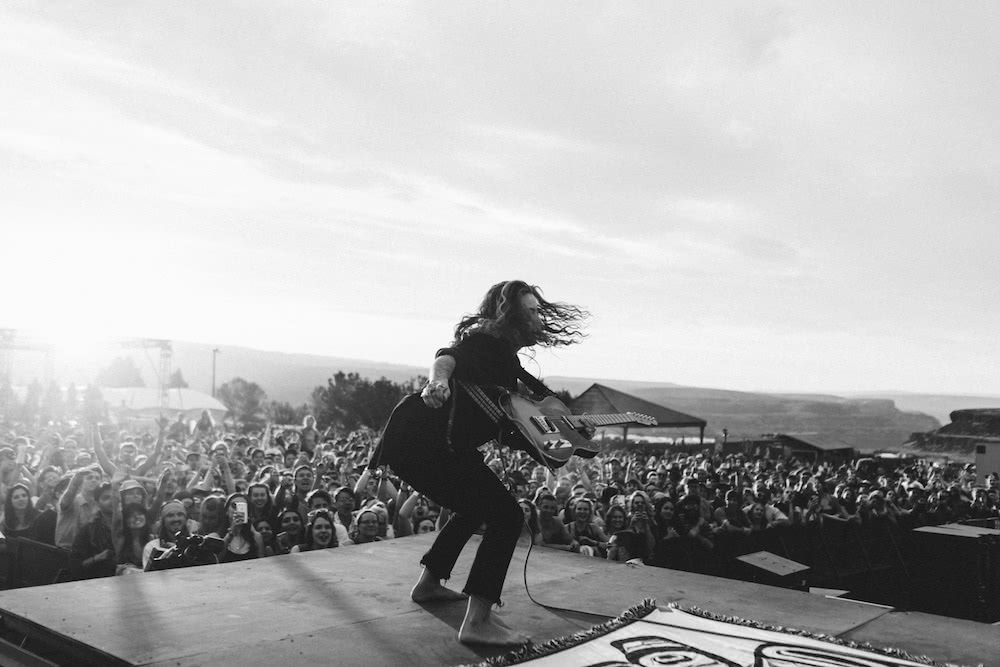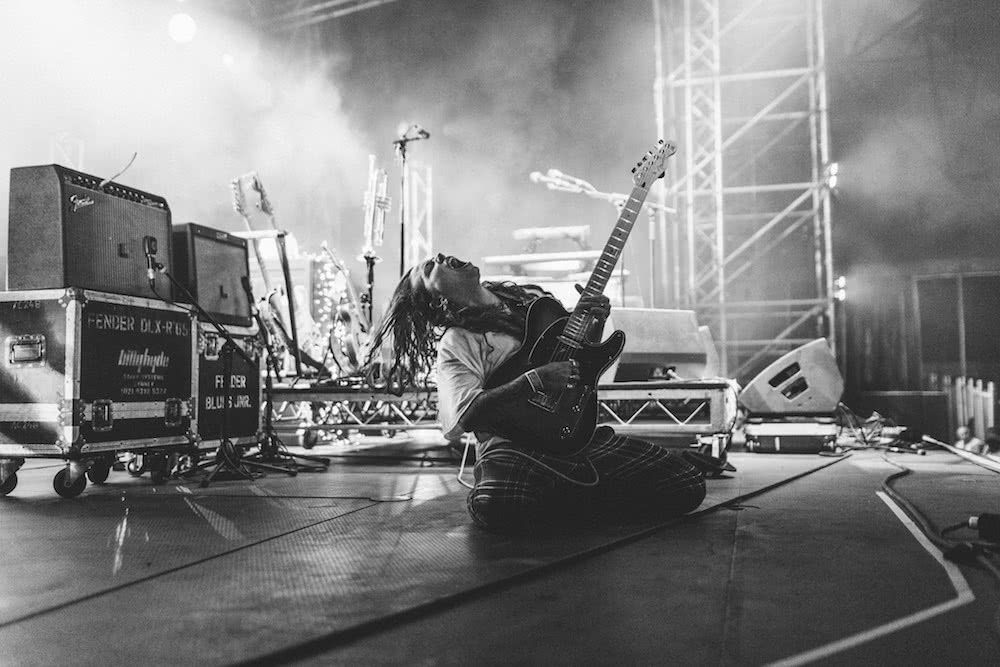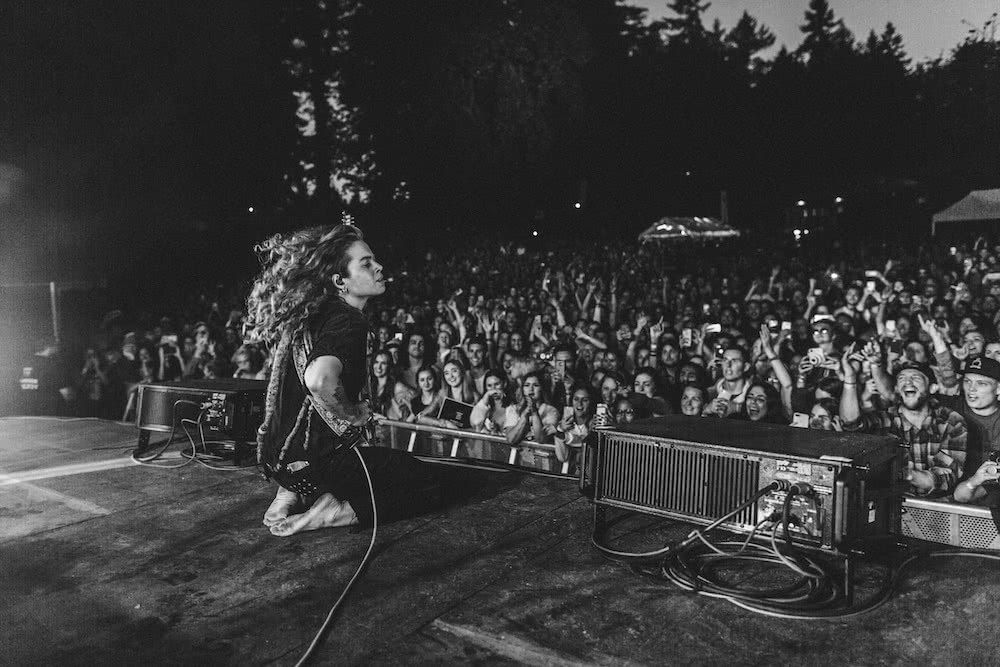The Making of Tash Sultana – an oral history

From the outside, the career of any famous musician seems practically effortless. Just take Tash Sultana, a Melbourne-born roots and blues-indebted loop pedal master. Over the period of two brief years, Sultana has gone from uploading viral videos on Facebook and Youtube to playing some of the biggest stages in the world, picking up multiple award nominations around the world and winning the unearthed artist of the year, and courting fame as a “one-person band” – not to mention a thrilling prospect to behold live.
But even overnight successes don’t come easy, and big breaks of any sort require years of hard work and preparation. Sultana’s story involves hours spent slaving over a multitude of instruments – by her own reckoning, she can play over 20 instruments – not to mention the hard work of countless behind-the-scenes players, who supported Sultana in the plight to become the internationally-renowned performer she is today. Sultana was given a guitar at the tender age of three by her grandfather, and has since then poured her life into the instrument, amassing hours on the street as a busker, and using fake IDs to play open mic nights.
To that end, here is an oral history of Sultana’s rise, told by the people who know her best.
Part One: Discovery
Regan Lethbridge, Co-Owner Of Lemon Tree Music: I first saw Tash at Little Buckley Festival in 2011 down in coastal Victoria. It was a Sunday lunchtime set: Tash was up there playing a 12-string and it blew my mind.
We didn’t meet properly until Tash supported Pierce Brothers at their sold-out Shebeen shows in early 2014. All credit to Pat Pierce, who wouldn’t stop talking about this incredible busker drawing massive crowds.
Jaddan Comerford, Tash’s U.S. Co-Manager with Lemon Tree Music: [Regan] called me one day so excited about this new artist named Tash Sultana. I went to a show with him to meet Tash and see the show. I was completely blown away.
In fact, I was at the show with my wife, Rachael. It was a midweek show and she needed to leave before it finished, as she had an early flight the next day. She told me not to come home until we were working with Tash.
Lethbridge: Dave Morgan and I run Lemon Tree Music. We signed Tash in June 2016 and things just went bananas. Immediately I started taking calls from everyone in agent-land from around the globe. There were endless label calls from everywhere…. It was just a crazy time.

George, WA. Photo: Dara Munnis. @daramunnis
Paul Harris, Sony Australia: A member of the Sony Music team in Melbourne, Marietta Ouzas, called me saying she had seen this incredible artist, and that I should really get down to Melbourne to see a performance as soon as possible. The next week Tash was playing a sold-out residency at the Northcote Social Club. I was absolutely blown away by it.
[Tash and I] met after the show. The following week, after telling Denis Handlin how exciting the performance was, we attended Tash’s first Sydney performance together at the Brighton Up Bar. Denis decided on the spot that this artist needed to be a part of the Sony Music family.
Lethbridge: Tash just had this magical quality you can’t quite put into words. Tash’s playing draws you in – time simply stops, even after [you’ve seen the show] hundreds of times. Every show is different.
Harris: It’s incredibly rare to see someone that early in their career play with such completely unbridled confidence. Tash [plays] for the fans, and for Tash. You can still see that in the performances today. Tash enjoys every single second of that show, and if you enjoy it too, that’s great, but if you don’t, she really couldn’t care less. I found that inspiring and alluring.
Part Two: Rise
Harris: The rate at which the early shows were selling out indicated that [Tash’s career] wasn’t going to slow down any time soon. But [a big indicator] too was the audience at those early shows. I remember being at the Newtown Social Club show and looking around. It was such a mixed crowd. There were gay couples, straight couples, indie hipsters, casual Triple j listeners, older people, teenagers…
I thought to myself: ‘This music is for everybody. There’s no set audience for this; it can go anywhere.’
Comerford: From that first show it was pretty obvious Tash would [connect in a big way]. Seeing is believing with Tash. So it’s about getting people to see the show. And if you can’t do that, it’s about getting content in front of people.
Lethbridge: We mapped out a plan in the early days to sell out all the clubs in Melbourne, so when shows started selling out with no promo and way before doors it definitely was evident something special was happening. At every show we had to keep adding dates due to hectic demand.
[Tash played] something like the Shebeen twice, The Toff, Ding Dong, The Curtain, the Northcote Social Club three times, the Corner Hotel three times, 170 Russell five times – which is the record –and Margaret Court Arena, where Tash got the record attendance from any act internationally.
David Toethuis, UK/Europe Co-Management With Lemon Tree Music: Hindsight is a wonderful thing of course, but with the combination of Tash’s great songwriting and an amazing live show, I absolutely believed Tash would potentially connect really strongly with an audience
Lethbridge: This was all in the space of two and a half years. Tash has been honing skills and playing since the age of three, but this was still a crazy two years. I still haven’t really processed it.
—
Part Three: International Acclaim
Harris: [I didn’t know if Tash would connect with international audiences] straight away, I have to admit. I did worry it might just be an Aussie thing. Then we started seeing the video numbers increasing, and the streaming numbers.
Lethbridge: You never really know if [an Australian artist] will make it overseas, but the first trips to the UK and Europe were just insane shows, and there was a similar response as in Australia. There were no Aussie accents in the crowd, and lines around the block with again no promo.
Harris: It finally all hit home when Tash headlined the Borderline in London and sold it out. I didn’t hear one Australian accent in the room that night. The shows got to that level so quickly, there was then no question that this was connecting on an international level.
Lethbridge: Music is a universal language, especially with the music that Tash creates. It really seems to connect on another level. We positioned Tash as a global artist from day one, and due to Tash’s insane work ethic and a brilliant, tight team it resonated in a massive way.
Comerford: America is a big country and if you want to break it, you need to be on the road and that takes time. When all’s said and done, Tash will make four visits to the US and Canada this year, and one to Latin America. That’s the kind of commitment required to break the market.
Lethbridge: The next tour Tash is doing in Europe has sold 55,000 tickets; she’ll play Brixton [three times.] That’s just madness before an album is out. And North America is on a similar level – which is mind blowing, as that’s such a tough [market] to crack.

SCL, Centennial Parklands, NSW. Photo: Dara Munnis. @daramunnis
Toethuis: Tash’s music has been served to and picked up by a lot of European triple j equivalents and public youth stations; places such as 3FM, EinsLive, and P3. The featuring of ‘Jungle’ in FIFA 2018 –which is a big, if not the biggest game over here in the UK – has also done a lot of good work in getting the word out and reaching potential new fans. But we’ve also just let Tash’s music and live show do the talking.
Comerford: Coachella this year was a real moment. At a festival dominated by Beyonce and Post Malone, Tash really stood out as a very unique artist on the bill. I was their both weekends and both times the tent was full to the brim.
Lethbridge: We have a long way to go but it’s feeling really good in these early stages. I’m really proud of Tash; it’s crazy even talking about how big they are overseas. And it’s still the same old Tash, who is like family to me now. We genuinely care about Tash as a human being first and foremost; everything else comes second. Health always has to come first – especially when there’s something like 22 countries on a tour.
—
Part Four: The Mainstream?
Harris: I still don’t think Tash has broken into the mainstream. I think [they’ve] actually subverted the mainstream to a certain extent, and that’s brilliant. Of course, the live numbers are huge, and the records are streaming at crazy levels, but it still feels like Tash is being discovered by the broader population.
Letherbridge: Tash isn’t a mainstream artist and we have strategically not gone there. We’ve stayed away from brands, so it’s Tash front and centre. It’s all organic. It’s about getting your head down, bum up and work[ing] as hard as possible touring the globe.
It still feels like Tash is everyone’s best-kept secret, and everyday people are discovering the music – which is really exciting, as we really don’t know how big this could go. The mainstream is a dangerous world living from hit to hit, so the plan was always to build a formidable live following globally. There is no better indicator of success in different markets.
Harris: It’s been incredible to see [Tash’s career] grow like that. It’s not been pushed in anyone’s face. The Hottest 100 in 2017 was a real, ‘Oh, ok, this is really connecting in a big way now’ moment though. That was when it started feeling very real to me, but there’s still so much further to go.
Lethbridge: Tash as a career artist has always been the focus. If breaking the ‘mainstream’ happens one day then great, but it’s certainly not something we think about daily. Our heads are in another world altogether.
—
Part Five: It’s All Tash
Harris: One of the most beautiful things about Tash from day one was their cast-iron confidence and vision. I don’t think that’s changed. I think the ‘music industry’ is a background, a canvas that Tash acknowledges is there, and that it’s important, but I don’t think it affects the approach in any way.
Harris: Most artists I have worked with have a vision, and a strong sense of identity and how they want to be perceived, but with Tash it’s different. I had this feeling after that first meeting; nothing can derail this, nothing can get in the way of this. Tash is like a train smashing through boundaries, and you’re either on board or you’re not. It’s a thrilling ride to be a part of.
Lethbridge: Tash’s voice is what hits me hard. I still get emotional watching some of the slower songs in the set, and the hairs stand up on the back of my neck. That is what makes an artist special – when they can connect like that in such a real way.
Tash honed their musical craft on the streets and built a fiercely loyal following. So massive credit to Tash. No one can ever take that away, or say Tash got lucky or whatever.
Toethuis: Besides being just a wonderful human being, Tash absolutely knows what Tash doesn’t want – which is a true revelation. It’s just great to help Tash with that vision
Lethbridge: Tash has developed a whole new style and vibe that’s unique. It’s what makes Tash “Tash Sultana”. In four years or so, I’ve never once seen Tash phone in a live show. It’s a two hour, high energy show that takes you to another place. That’s the beautiful thing about music I guess. It’s what gets us out of bed every day.

Vancouver, BC. Photo: Dara Munnis. @daramunnis
Tash Sultana’s new album Flow State is out August 31st.
This article originally appeared on The Industry Observer, which is now part of The Music Network.






























